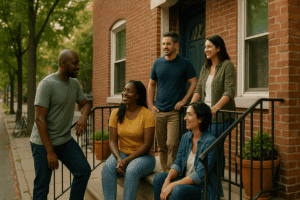At a Glance: Overcoming Sobriety Fears with Austin Sober Living
-
Common worries like “I’ll lose friends,” “life will be boring,” or “I’ll fail” are normal—and addressable with the right support.
-
Sober living adds structure and accountability (peer support, drug/alcohol testing, meetings) that reduce relapse risk while confidence builds.
-
Daily life in a sober home encourages healthy relationships, new routines, and trying new activities—key to redefining identity in recovery.
-
Extra time in a supportive environment helps you transition from rehab to independent sobriety at a sustainable pace.
-
Getting started is straightforward: browse Austin homes online; options also available in Houston, Colorado Springs, and more.
Just like any major lifestyle change, staying consistent will require hard work, commitment, and resilience, but an Austin sober living homes can provide many life tools, skills, and experiences that are particularly advantageous for individuals in recovery.
First, let’s talk about some of the most common fears people have regarding their sobriety. Then we’ll dive into the perks of living in an Austin sober living house.
Common Fears About Sobriety
Yes—sobriety fears are common; people worry about lost friendships, boredom, failure, and identity shifts.
Just because a person has completed a drug and alcohol rehab program, doesn’t mean they’re suddenly fearless and equipped to take on the world sober. Maintaining sobriety takes time and people in recovery may find that they learn many valuable lessons while adjusting to a new sober life.
Here are a few common fears about sobriety:
- I’ll lose all my friends.
- My friends and family are going to think differently of me.
- Life will be boring without drugs and alcohol.
- I’m going to fail.
- All of my hard work in rehab will be for nothing.
- I’m going to be rejected by others if I ask for help to stay sober.
- I don’t know who I am anymore.
Whether a person is still working to internalize the concepts of the 12-step program or they let these types of fears control them, fear can be a powerful motivator for behavior and these concerns should be taken seriously and addressed promptly, as letting them fester may lead to emotional distress and relapse.
See How Other Residents Have Overcome Fears About Sobriety
5 Important Ways an Austin Sober Living House Can Help You Overcome Your Sobriety Fears
Sober living houses aren’t just there to keep people sober. While that is certainly a primary function, transitional living programs offer many more benefits that contribute to the overall wellness of residents in recovery.
Here are five ways an Austin sober living house may help you overcome some of the fears you have about sobriety.
- Living in an Austin sober living house may encourage you to try new things.
Sometimes in addiction recovery, we lose sight of who we are. We spent so much time crafting our lives around drug and alcohol abuse and once that’s gone, it can be difficult to redefine our identities and lives. While enrolled in a sober living program, residents are encouraged to spend time with sober peers, seek out volunteer opportunities, and participate in group activities. Additionally, being in a new environment may ignite a spirit of adventure and encourage you to get out and try a new hobby, sport, or food. It’s important to try new things in sobriety, as you will need different ways to fill your free time instead of spending that time using drugs and alcohol.
- An Austin sober living home provides opportunities to build healthy relationships.
As you adjust to a new life of sobriety, you may also have to learn to accept the fact that some relationships from your prior drug-abusing lifestyle may be beyond repair or unwise to maintain. Losing friends while trying to cope with a new lifestyle may leave you feeling depressed, anxious, or lonely, but a transitional housing program will provide so many opportunities to connect with peers who are also getting sober and give you the chance to start building healthy relationships with new friends.
- An Austin sober living home provides accountability.
Studies show that active engagement in peer support groups is a key predictor of sustained recovery. As a resident of a sober living home, you will receive peer support and for accountability in a number of ways, including close peer guidance throughout your sober living and recovery programming, regular drug and alcohol testing, and required participation in 12-step group meetings and weekly resident meetings. These structured support systems have been put in place by sober living house management to help ensure the ongoing sober success of residents.
- An Austin sober living house gives you time to adjust to your new lifestyle.
Life transformation is never instantaneous. It takes time, effort, and mindfulness. Choosing to live in an Austin sober living house is a conscious decision to commit to a life in recovery and make the necessary adjustments to sustain your sobriety. Whether you need to spend three months at a sober living home or two years, any time spent living there will give you a chance to gradually establish your new life of sobriety and gain the confidence and self-efficacy you need to live sober independently.
- An Austin sober living house offers support as you create a new identity for yourself.
Creating a new identity for yourself without drugs and alcohol can be difficult, but spending some time living in a sober living house may provide the emotional and psychological support you need to figure out who you are and what your life looks like without substance abuse.
Quick Map: Fear → How Sober Living Helps
| Fear | What Sober Living Provides |
|---|---|
| Losing friends | New sober peers and supportive group activities |
| Boredom | Structured routines, healthy hobbies, and volunteer opportunities |
| Failing or relapse | Accountability through peer support, drug and alcohol testing, and recovery meetings |
| Identity loss | Time, guidance, and encouragement to redefine yourself in sobriety |
| Unstructured days | Consistent house rules, daily schedules, and peer guidance for stability |
Learn How Our Homes Can Help You Overcome Your Fears
How to Enroll in an Austin Sober Living House
Living in an Austin sober living house may prove to be very advantageous, especially for individuals who do not have a stable, sober environment to return to upon the completion of the drug rehab program. If you think living in an Austin sober living house may be the right choice for you, it’s easy to get started.
-
Browse Austin recovery homes with our online booking tool and compare room types.
-
Choose a fit for your budget, lifestyle, and needs; we offer options for men and women.
-
If Austin isn’t right, consider Houston or Colorado Springs homes and follow the same steps.
At Eudaimonia Recovery Homes, we provide a simple online booking tool that allows you to browse through our Austin recovery homes and choose the one that best suits your budget, lifestyle, and needs. We offer several different apartment room types and homes for men and women in recovery in the Austin area. Eudaimonia also provides sober living homes in Houston and Colorado Springs if you find that Austin is not the right fit for you.
Trusted Resources for Sobriety & Sober Living
- Compare local options: Austin sober living
- Read SAMHSA’s overview of recovery housing best practices
- Review NIDA’s guide to evidence‑based treatment and recovery
View Our Availble Sober Living Homes
FAQs: Overcoming Sobriety Fears & Sober Living in Austin
Why am I scared to get sober—is that normal?
Yes. Fear is common in early recovery because sobriety changes routines, relationships, and identity. Recognizing fear as normal is the first step to working through it.
What is the fear of sobriety called?
Some sources call intense fear of sobriety nifaliophobia, reflecting anxiety about living without alcohol or drugs.
Will life be boring if I’m sober?
No—many people report more satisfying social lives once they build new routines and friendships without substances. Structured support helps this transition.
How do I overcome fear and anxiety in early recovery?
Use a mix of supports: peer/community groups, therapy, skills for cravings, and gradual exposure to feared situations—paired with daily structure.
What is a sober living home and how does it help with sobriety fears?
Sober living offers a substance‑free residence with accountability, peer support, and routine—bridging rehab and independent living so confidence builds over time.
How long should I stay in sober living?
Length varies by person and program; many residents remain until they’ve established stable routines, work/school balance, and a recovery network. Ask homes about typical stays.
How much does sober living cost in Austin?
Prices vary by neighborhood, amenities, and support level. Review local roundups and call homes directly for current rates and what’s included.
What rules or requirements should I expect?
Common expectations include maintaining sobriety (with testing), attending meetings, following house guidelines, and contributing to chores/community standards.
What’s the difference between sober living and a halfway house?
Sober living focuses on peer‑supported recovery housing; halfway houses often serve court‑mandated reentry and may have different structures and timelines.
Does insurance cover sober living?
Generally, sober living rent isn’t billed to insurance because it’s housing rather than licensed treatment—check each home’s policies and any bundled services.
Are there MAT/Suboxone‑friendly sober homes in Austin?
Yes—Austin includes homes that accept residents using medication‑assisted treatment; confirm MAT policies during admissions.
What support and amenities does Eudaimonia offer in Austin?
Eudaimonia provides community‑driven housing with accountability, peer support, and access to services like IOP, employment/education help, and regular testing.




